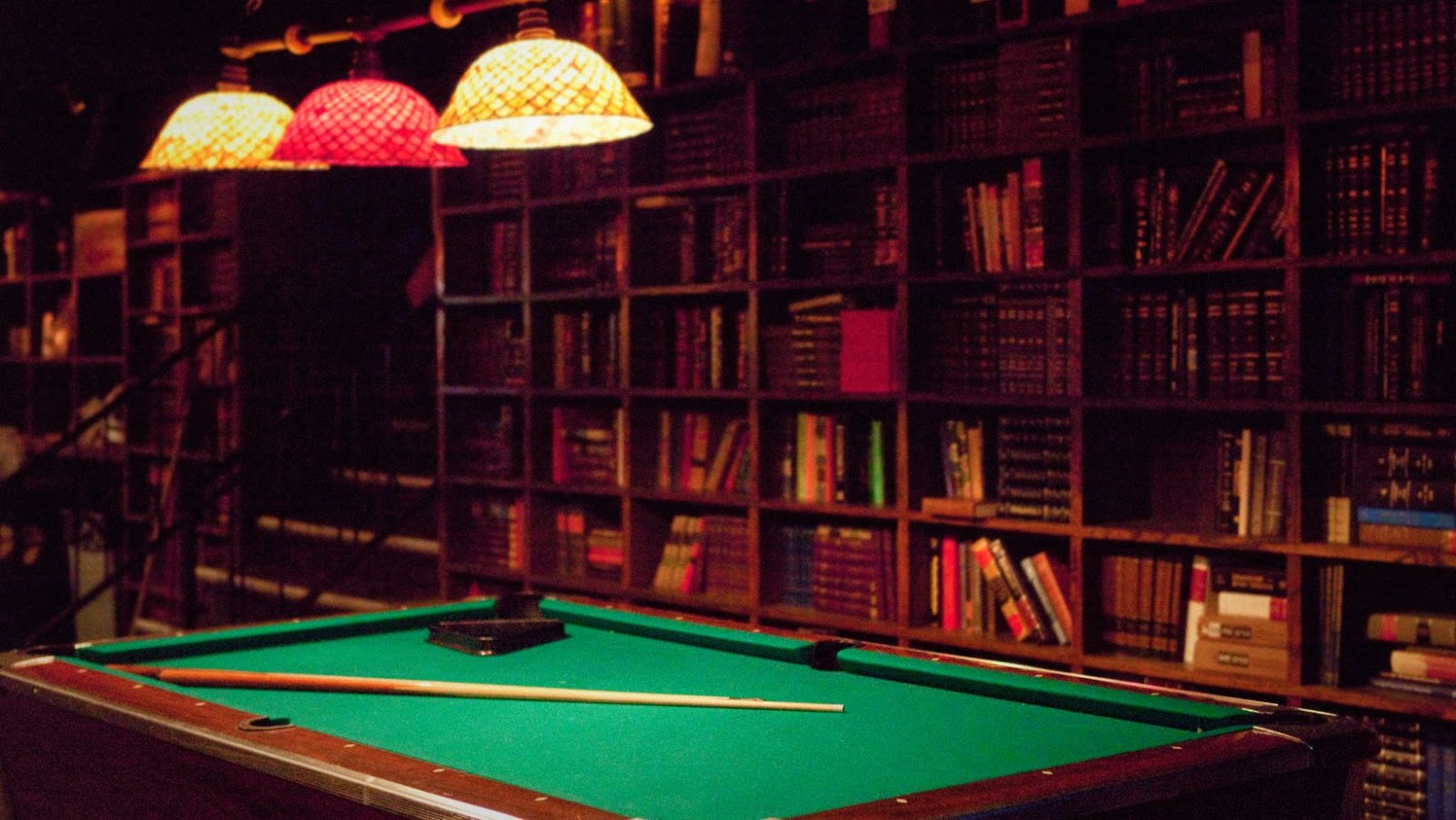
Do you fancy yourself a pool enthusiast? Are you unsure what a billiard room might look like and what it would offer? Look no further!
Our article explains the components of a billiard room and why having one is an excellent idea. You can now create the perfect area to practice your shots, or simply enjoy some leisurely time with friends.
What is a Billiard Room
Billiard rooms, also known as pool halls or game rooms, are typically establishments designed for the purpose of billiards sports. However, a growing number of these establishments also incorporate other activities such as video games, foosball tables, poker or even darts. A typical billiard room will feature enormous amounts of billiards accessories and equipment – cue racks, balls, table covers and chalk among others.
Some billiard rooms are part of larger sports bars or restaurants while others are free standing locations dedicated to providing an enjoyable gaming experience for all. Most feature a wide selection of pool tables to choose from with varying sizes suited for different levels of play. Usually the tables have lights overhead so they can be used at any time of day or night.
Additionally, billiard rooms often host tournaments between aspiring novices and seasoned players alike. These events can range from friendly competitions to high stakes tournaments depending on where you choose to play in order to take your game up a level in its development.
Different rules apply for different countries and rule variants; it is worth investigating before playing a game in order to familiarize yourself with regulations that may be applicable in certain locations around the world. Furthermore, billiard etiquette dictates particular considerations when playing in competitive settings versus casual scenarios – so no matter what kind of venue you find yourself in understand that being respectful and courteous is always appreciated by competitors and staff alike!
History of Billiard Rooms
The history of billiard rooms dates back hundreds of years to the 1600s and the popular pastime of kings and nobility. Originally, billiard rooms were spacious indoors play areas made up of green, wooden tables that were covered in felt or baize, surrounded by a rail with pockets where the balls would be collected. Billiard rooms often had multiple tables so that more than one game could be played at once.
Billiard room furniture was often inspired by the royal courts with elegant chairs, sofas and tables; ornately carved mantelpieces, mirrors and vases; paintings or tapestries along the walls; and intricate rug designs or carpets across the floors.
Over time, billiards has evolved from being predominantly a noble’s game to a popular leisure activity for everyone everywhere. As games became faster-paced with bigger challenges due to technological innovations in equipment handling, cue sticks and tables changed shape and size to accommodate larger balls. Lighting also become more essential for sleeker play.
The popularity of billiards isn’t just confined to homes either – it’s an activity enjoyed in pubs, clubs and gaming dens around the world as well as private billiards rooms in people’s homes. A private room gives endless possibilities of décor while offering an intimate setting for friends to enjoy each other’s company while playing one of the oldest games around!
Types of Billiard Rooms
There are many different types of billiard rooms, from small home setups to grand, luxurious professional outfits. Whether you’re a beginner looking to try out the game or an experienced player aiming for competition-level play, there are billiard rooms to suit your needs.
The most common setup is a standard billiards room with three walls and one large window at the front. This is usually found in taverns and local pubs but is also used in many private homes. It will typically have a few tables with varying sizes and styles of play, such as 8-, 9-, 10- and 12-foot tables. Most public rooms will also include video games and other arcade games as well as air hockey or pool tables.
For more discerning players, there are high-end luxury suites available which feature professional-grade equipment crafted by industry veterans. These state-of-the-art facilities create an atmosphere designed around each player’s individual skill level and style of play. This type of setup typically contains multiple tables with specified pocket designs allowing for more precise shots and cushion angles customized for maximum accuracy and control. In some cases, these can even be fitted with specially designed lighting systems to better simulate natural lighting conditions while adding to the overall ambiance of the room.
Whether you’re just starting out or a seasoned competitor, having access to a quality billiard room is essential for honing your skills in this classic game.
Benefits of Playing Billiards
Playing Billiards provides an abundance of benefits that can positively influence your physical, mental and social well-being.
Physically, billiards requires precision, timing and skill which promotes fine motor coordination, balance and hand-eye coordination. The game also encourages a natural form of exercise without the need for a gym membership or cumbersome equipment. Playing billiards can also help to strengthen muscles throughout the body as well as promote healthier posture that can benefit your overall health.
Mentally, playing billiards is a great way to keep your brain active. It encourages critical thinking, strategy development, problem solving and risk assessment while requiring focus and sharpening anticipation skills. When you are playing with others in a social setting it can also stimulate creative dialogue between players on how to improve technique or adjust strategies to face new challenges. After you finish each game you’ll also develop greater confidence in your analytical skills for future games and pursuits outside the pool hall environment.
Socially, games of billiards provide an enjoyable way to spend time with friends or family members in a friendly environment–which is always welcome! Whether at home or at the pool hall this allows for rare offline-time shared together which otherwise could go by unnoticed in our busy daily lives. As you spend more time engaging with people around the table you will develop better communication skills that translate over into other aspects of life such as work or relationships which leads to less verbal conflicts over silly excuses like “You didn’t understand what I was saying” or “I don’t like what he said” due to not understanding each other’s true motives anymore… now there will be no excuses left!

Billiard rooms offer so much more than just playing pool as they’re places where memories are made through laughter shared around the table and stories told across many games!
Equipment Needed in a Billiard Room
A billiard room can provide an enjoyable experience for people looking to play pool or other billiards games. To ensure that your billiard room is a comfortable and inviting space, you should have certain essential pieces of equipment. From cues and balls to tables and corner pockets, here are the basics of what you need to create a great billiard room.
Cues: Cues are the most important part of any game of pool, so make sure you stock enough cues in various sizes and constructions so all players can find one suitable for their height, playing style, and preferred type of grip. You may also want to include specialty or novelty cues with designs or textures on the handle for an extra bit of flair.
Balls: Most basic pool sets contain 16 balls comprised of seven striped balls, seven solid colored balls and two 8-balls. Assuming all standard rules will be observed when playing in the room, these are all the balls you need for a quality game.
Tables: The centerpiece of any quality billiard room is a good quality table that can withstand wear-and-tear from regular use as well as rambunctious players. Be sure to get a table that is large enough for all competing players and ideally has cushions with some “give” or agility in each shot so that hard shots do not leave permanent dents in the wood surface.
*Some additional pieces may also be needed depending on your specific gaming goals such as corner pockets, scoreboards or wall racks to store cues when they’re not in use.*
Etiquette and Rules of Billiards
Perhaps one of the most important aspects of billiards is the etiquette and unwritten rules of the game. Whether you are playing at home or in a billiard room, there are certain rules and standards of behavior that should be followed.
First and foremost, lessons should always be given with respect for the players’ skill levels. It can be a bit tricky to match players fairly, but an experienced billiards player can usually assess each player’s skill and make sure everyone is treated fairly.

It is also important to behave appropriately when it comes to placing bets or entering into competitions. In general, it is not acceptable to place a bet on anyone other than yourself during a pool game. If someone else wants to make a wager, they should find another person who feels confident in playing him. This ensures that all players are playing honestly and within their own limits so as not to risk affecting the outcome too much by having too much riding on one individual’s performance.
Finally, it is always important to consider any house rules set forth by the establishment in which you’re playing before getting started; they may indicate which kinds of games can be played on different equipments or set guidelines for wall hits (bouncing off walls), amongst other things. Additionally, all players should adhere to simple courtesies like returning balls back after pocketing them–this will keep games running smoothly for everyone involved!
Popular Billiard Games
Billiard rooms are locations filled with billiard tables where people can come together to play various forms of the game. Billiards is considered a skill-based sport and a craft that requires precision, accuracy, and analytical skills. Many people go to billiard rooms for social interaction or to make new friends, as well as for recreation and competition.
While there are many different types of billiards games out there, popular ones often found in billiard rooms include 8-ball, 9-ball, straight pool, one-pocket and carom (three-cushion). 8-ball is one of the most common games found in billiard rooms as it involves two players competing against each other to sink all their balls first before their opponent. 9-ball is another popular game where players must pocket the balls according to their numerical order until the ninth ball is pocketed. The object of straight pool is to pocket any number of object balls necessary according to rules and regulations set forth by either specific leagues or tournaments. One pocket is a type of game where both players get one pocket each side on the table and must try to sink seven out of nine objects balls assigned in any order they choose into those designated pockets. The last game mentioned here – carom – involves three object balls that must be struck by the cue ball in such a way that at least two object balls are made contact with consecutively without touching any other surfaces on the table except for its cushions during each shot – this requires finesse!
Billiard Room Maintenance and Care
Maintaining and caring for a billiard room is essential to providing a safe, comfortable and enjoyable experience for both players and spectators. A well-maintained pool table can last for decades, so it’s important to take the time to care for your equipment. Here are some tips to help you keep your billiard room in top shape:
1. Protect Your Patrons: Make sure that the playing and spectator areas of your billiard room are free from any debris or hazards that could affect player safety or create embarrassing messes. Ensure that there is adequate lighting so players can see their shots clearly and safely navigate the playing field.
2. Clean& Condition – Regularly wipe down surfaces with a damp cloth to prevent dust buildup, which can impact playability. For felt-topped tables, use pool table brushes combined with vacuum cleaners to remove dust particles and lint from the felt surface and pockets regularly. Condition the felt according to manufacturer’s instructions every few months with a quality wool cleaning cloth or product such as Simonis Woolen Lepreeze™ Polish & Preserver/Cleaner, which will help keep the felt in good condition longer between cleanings.
3. Repair& Replace – Check all equipment, including balls, cues, racks, etc., on a regular basis for damage or wear. Fix small repairs yourself if safety concerns permit; otherwise call an expert technician who specializes in billiard table repairs immediately if needed.
4Cue Care – Properly maintained cues often look better than new ones! Cure cue warping by storing them vertically while not in use; wax your shafts periodically using only premium quality products such as Peradon™ Cue Wax; replace worn tip ferrules with special ferrule shims stored inside cue tube cases; clean old tips using leather cleaner and then re-tip them when necessary — this will improve accuracy of play while prolonging balance of cue weight/distribution overall!




